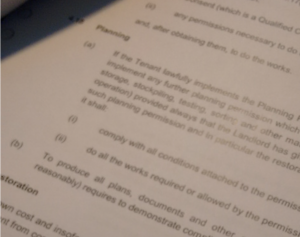
Matthews & Son LLP have many years experience in long term minerals and waste leases and are well versed with avoiding the pitfalls. But what are they?
One thing that is sometimes, sadly, overlooked by both parties involved in a leasehold minerals or waste operation is the importance of relations between the parties in the long term. Minerals and waste sites, by their very nature can run for many years, and in some cases decades. It is therefore essential that at the outset both parties, landlord and tenant recognise the fact that they will be inextricably linked for a considerable period of time. For that to work requires considerable forethought given to the contractual basis of any deal. In the present climate, where business performance is stressed and challenged by a variety of factors, the importance of good relations is perhaps now in the spotlight more than ever, though these challenges are always ongoing. Careful negotiation from the outset can often remove causes for disagreement and misunderstanding down the line.
Leasehold minerals and waste operations are most commonly controlled by way of a lease contract, but are usually quite different from a standard commercial lease. Minerals and waste sites all differ and, as such, the agreements put in place at the outset differ also. Potential landlords and tenants should beware the advisor suggesting an ‘off the shelf’ type contract. A ‘good’ lease is one that accurately reflects the specifics of the site in question. It needs to be bespoke and built to fit the specific circumstances.
This is not just about the financial elements of any agreement (although they are, naturally, high on the list of importance), but also about how the agreement works for both parties year on year. The skill in an advisor negotiating terms on your behalf comes not only in obtaining the right financial terms, but also an agreement that is workable and envisages the pitfalls that can appear over a long time period. This can require careful compromise to ensure the site can work efficiently for all stakeholders over its life. There is little point putting an agreement together that hampers the operations of the mineral or waste company so heavily that the site becomes unproductive and everybody loses.
Of course, this is not to say such agreements should be loose and wooly. The lease is the most important link in the relationship between landlord and tenant and as much as the operator will want clear rights, so the landlord will want a strong element of control. And this is the balancing act that a good advisor will seek to achieve. A financially sound, yet workable deal that allows relations to move smoothly into the future.
Tenants will need to be receptive to the needs of the land and minerals owner and be prepared to move away from what they may have been used to elsewhere, as they too can sometimes be guilty of assumng a ‘one size fits all’ approach to leases. Tenants financial affairs, ownership structures and tax position can all lead to a need to rethink how the agreement should be structured. When it comes to restoration, both sides will need to undertand the balance to be struck between cost, the requirements of the Local Planning Authority and future aspirations of the landowner to whom the restored site will revert in the long term. These drivers can differ signifcantly, but only a compromise can see a site move forward.
If that means developing a bespoke contract from the ground up, even if it completely breaks away from ‘the norm’ then so be it. Both parties need to reach an understanding on each others needs if the agreement is to work. In our experience there is always a way and we have been negotiators on some extremely complex and ‘different’ leases in the sector.
Sadly though, there are some truly dreadful agreements in existence in the minerals and waste sectors. Landlords being under paid, operators over paying, a lack of flexibility to make an operation work. And in our experience such leases often lead the parties down a path to disagreement and dispute (with all that brings on the cost front).
Of course, we cannot ‘cannot crystal ball gaze’ and no agreement can cover every conceivable scenario in the future. But a clear understanding from the outset by both parties and their advisors can help to develop a fair yet robust agreement.
This is not a matter to be taken lightly. On signing that agreement for say 25-30 years, you are naturally going to be working together for a considerable time. An investment in sound advice at the outset can only serve to minimise issues further down the line.
